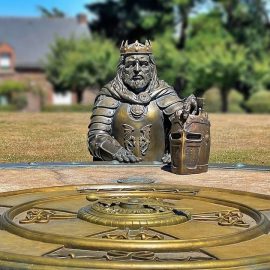

This article is an excerpt from the Shortform summary of "Moonwalking With Einstein" by Joshua Foer. Shortform has the world's best summaries of books you should be reading.
Like this article? Sign up for a free trial here .
What is the role of memory in education? Is memorization really the best way to learn?
Memory in education has a long history. Traditionally, the school system was focused on memorization. But the role of memory in education has changed.
Keep reading to find out how memory in education has change and why.
Memory in Education: Does Memorization Help You Learn?
Memory training used to be part of a classical education. Today, the educational system looks down on rote memorization. What happened to memory in education?
Early education was based on military training, and the military’s goal wasn’t to train people to think, it was to train people to follow orders. Therefore, at the beginning of the twentieth century, rote memorization was the norm. Students memorized all sorts of information including speeches, dates, poetry, and times tables.
Educators used to think that memorization was good for the brain. People weren’t just learning the facts that they were memorizing, they were training their memories. Educators believed in “faculty psychology,” the idea that the mind was made up of individual “faculties” that could be developed individually.
The rote memorization approach had its critics and reformers over time:
- Philosopher Francis Bacon considered the memory arts no more than a party trick.
- Jean-Jacques Rousseau wrote a novel about a child who learned by experiencing life rather than going to school and memorizing facts in traditional subjects.
- Dr. Joseph Mayer Rice visited schools in New York and thought the approach was dehumanizing.
- William James did an experiment in which he memorized poetry. He expected that after memorizing Victor Hugo’s “Satyr,” he’d then be able to memorize Paradise Lost and other texts more quickly. However, when James finished Paradise Lost and went back to Hugo, the time it took him to memorize it increased. Practicing memorization had actually made him worse at it. Later studies found that practicing memorization didn’t particularly improve anyone’s ability to do it.
- John Dewey came up with “child centered” education, which did away with rote memorization and focused on experiences. Students would plant gardens to study biology instead of memorizing facts about plants from their textbooks.
Memory in education techniques are sometimes criticized because they take information out of context. For example, one teacher helped his students remember the differences between Lenin and Stalin’s economic systems by telling them to picture a constipated Lenin on the toilet. (He was constipated because of his mixed economy.) Stalin shows up and asks what’s going on, and Lenin responds, “Bread, peace, and land.” The image is memorable, but it doesn’t result in an understanding of economics.
Eventually, progressive education reform changed the school system. Over the last century, educators have change their ideas about memory and education:
- Decided memorization is not only useless but actually bad for the brain
- Changed their focus from teaching raw content to teaching thinking, creativity, and reasoning
- Almost completely removed rote memorization from the curriculum
- Made school more interesting and pleasant
There are critics of this approach of memory and education, too:
- E.D. Hirsh Jr. warns that students aren’t learning enough information to come out of high school with any cultural literacy. 66% of American seventeen-year-olds don’t know when the Civil War took place. Hirsch wants to reintroduce facts to the curriculum.
- Tony Buzan didn’t learn about memory techniques until he was 20 and was horrified that there existed a method to help you remember what you’d learned, but no one was teaching it. In 1973, he worked with the BBC head of education to put together a book and series about memory techniques.
- Raemon Matthews, a history teacher at Samuel Gompers Vocational High School, believes that hard facts are important. Even if you think education is purely about teaching students to learn and think, they need some framework from which to do that. To analyze, you need to have information to analyze—the facts alone won’t help you understand anything, but you need to have some facts in order to understand.
- For example, Matthews trains a small group of his students, the “Talented Tenth,” to compete in the US Memory Championship with the goal of using memory techniques for education in general.
Memory and education and learning are related. You can better process new information when you have existing information in your brain to associate it with. The bigger your web of associations, the more likely you are to remember new things, and each new thing you add allows you to connect even more new things.
Memory in education may still have a role. It’s likely that memory in education can help you with certain skills, though expert opinions vary.

———End of Preview———
Like what you just read? Read the rest of the world's best summary of Joshua Foer's "Moonwalking With Einstein" at Shortform .
Here's what you'll find in our full Moonwalking With Einstein summary :
- The memory techniques that took the author from novice to US memory champion in one year
- The 6 key types of memory we use everyday
- Why memory isn't just genetic, and how you can improve your memory with the right techniques






